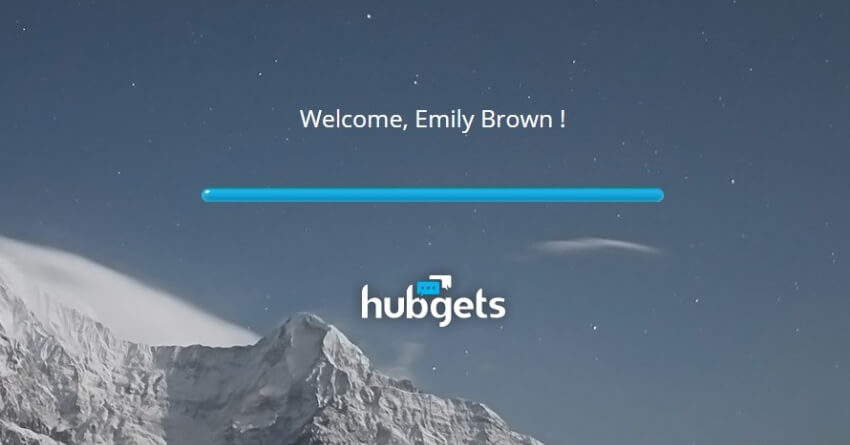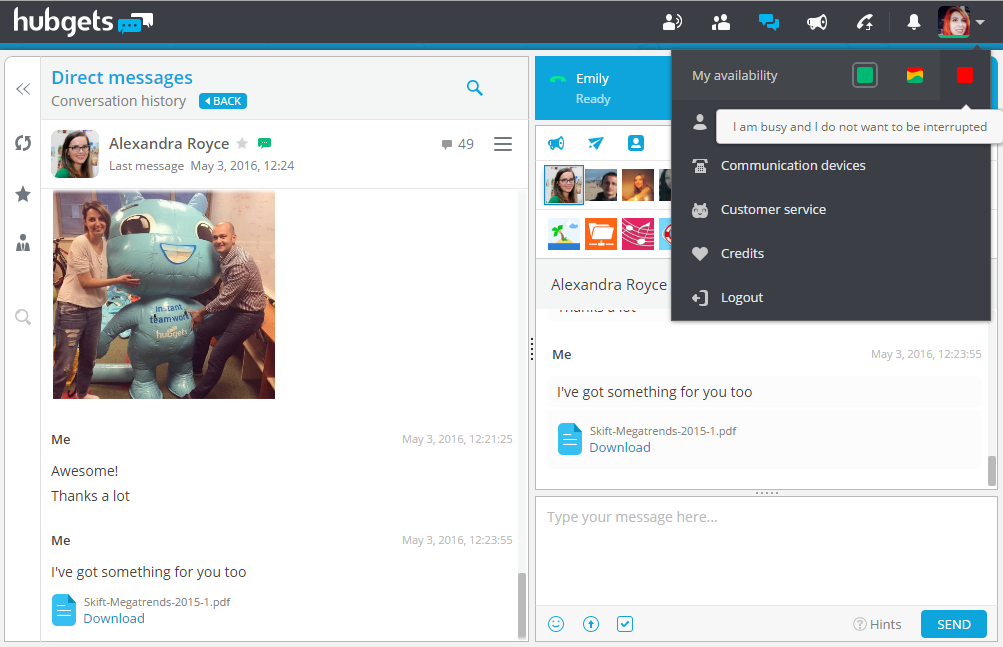Here at Hubgets we’re really fond of our Team board. We think of it as our daily roller coaster or water cooler. It’s where we share everything and anything that concerns us as a team – both serious and fun stuff, news, updates, photos, videos, and web content. Now you can understand why we couldn’t leave our “daily playground” out of our latest improvement plan. In this article, we’ll tell you how we made the Team board sleeker and better.

Emilia Bratu' Post
There is a rich history of programming exploitation which makes use of the insecurity of the C memory model. To counteract the threats of memory corruption attacks, several techniques have been implemented. The problem still remains though, and since the programmer is responsible for making all the checks, even the most restrictive protection schemes have their limitations.
Radu is a Junior C/C++ software engineer on the Hubgets Core team. Since memory corruption attacks are something every programmer should be aware of, he came up with the idea of writing the current article, where he explains how some of these memory corruption attacks may happen, indicating a set of solutions that are presently applied to prevent them. You’ll also find a series of tips on how, under specific circumstances, one can use printf to inject instructions even under stiff security constraints.
I want it all, and I want it now. Yes, that’s Queen’s famous tune, but that’s also simply put the principle behind Hubgets’ advanced search engine.
Whatever you’re searching for – Direct Messages, Topic conversations, Team Board updates, contact details or call history records, in Hubgets all search results are now. With just a few clicks, the algorithm at the core of the search engine allows you to instantly revisit past conversations with a particular team member or customer, extract precise information from a certain Topic, view phone call details or listen to call recordings.
As a member of the SQA Automation team, Marian’s job is to investigate an application that is constantly under development. Most of the time, this implies testing dynamically generated elements.
Due to his experience in using Selenium WebDriver and WebDriverWait for testing such apps, Marian decided to detail how these two solutions simplify testing, hoping that it would help other SQA automation software engineers in their job.
Every day we deal with whirlwinds of texts, emails, tweets, never-ending streams of Facebook articles and viral videos, personal posts on various platforms, and more. Specialists have a name for this daily challenge; they call it “information overload”. But how much insight can we really gain from this vertiginous information flow we’re constantly exposed to?

In The Information Diet: A Case for Conscious Consumption, American technologist Clay Johnson estimates that “we spend up to 11 hours out of every 24 in a state of constant consumption, gorging on information ceaselessly spewed from screens and speakers we hold dear.”
If this is the time we spend processing information one way or another, then the amount of data we are dealing with on a daily basis is bigger than we can imagine. The question is how much data is mere information and how much is knowledge?
Food for clueless thought
The thought of spending 11 hours a day filtering texts, instant messages, phone calls, emails, downloads, videos, status updates and tweets makes you pause over how much time and energy you’ve got left for absorbing relevant information and converting it into knowledge. Not much, right?
In his article, Could the Evening News Be Bad for Your Health? The Dangers of Information Overload, William J. Lynott reminded us that our ability to gather and deliver information has increased greatly since the 17th century, but the brain’s ability to absorb and process it has not changed since the days of the cave man. Yet, we allow ourselves to be bombarded with endless incoming flows of information, forcing our brain into a “breaking news” mode constantly focused on:
- grasping information
- storing it into temporary files
- identifying the noise in it
- then deleting it to make room for
- the storage of relevant information
Growing knowledge only comes afterwards and, somewhere along the way of this 5-step process, things tend to get confusing. Because people often misinterpret mere information for knowledge. And when the intake of useless information gets too large, we are often left clueless.
It’s filter failure
Let’s see how information overload translates in the workplace – a common context for information fatigue caused by massive information sent back and forth in person or using communication technology. Besides the daily ping pong of facts and essential data between individuals and teams, there’s a lot of jibber-jabber which passes off as information. In consequence, our brain gets exhausted from trying to figure out what we need to know and what we can ignore.
For one thing, communication technology is here to stay. You simply can’t do without it, not in the modern workplace. So, the question is what would you prefer: lack of information or too much information? I go for the latter, and I’m not the only one. In his acclaimed book Here Comes Everybody on the power of organizing without organizations, Clay Shirky said it’s not information overload, it’s filter failure.
Ironically, the way I see it, communication technology plays a dual role particularly in the workplace: enabler vs. savior. On the one hand, it enables the assault of information by allowing people to share any type of information, on any channel they want, at any time – on many occasions oblivious of your interest in the information shared. On the other hand, it provides people with the tools to steer communication flows and filter out the noise triggered by excessive information loudly brought to your attention by endless notifications and alerts.
Let Hubgets filter the noise
Filtering data flowing down communication channels does not mean curating data automatically – we’re not there yet. What we can do is filter the noise made by information in excess. The reason is simple. Not every piece of information we receive needs our attention or is relevant for us. So, if we pay attention to every incoming message or phone call, only to discover they were not that important, we’ve already absorbed useless information that will leave little room and time for storing actual knowledge.
Information fatigue, as I’ve experienced it, diverts your attention from essential data, leads to loss of focus, fuels an incapacity to stick to one task and makes you frustrated at the constant interruptions created by new information constantly coming in. In short, it messes with your productivity, stealing your time at work and delaying your end-results.
It would be unrealistic to say Hubgets eradicates information overload. Communication technology cannot control the amount or quality of information you’re being sent, but it can hand you the power to decide how much information you’re willing to absorb. Hubgets does that by allowing you to deal with data in two stages of the communication process: when bombarded by information overload and when converting relevant information into knowledge.
Whenever you find yourself swamped by jibber-jabber or irrelevant data, you can put a filter on top of it. You can identify the channels with a distraction factor and you can pause the overload. When you’re curating the information received, you can put a tag on it – your own personal filter that will help you store and, later on, locate the knowledge acquired.
Buffer information overload
Hubgets lets you to discard excessive information on your own terms. You can set Hubgets to buffer excessive information so that you can deal with it when you have the time and energy.
For example, you can set your status to Busy and this will stop pop-up notifications on incoming direct messages, phone calls, Topic updates, and file transfers. While notifications on possibly irrelevant information are buffering, you get to focus on what’s important for you. This doesn’t mean you’re putting up communication barriers. Phone calls get transferred to your voicemail, messages, updates and file transfers get through without distracting you from your work. You can prevent unfiltered information from taking a hold of your time, without disconnecting.
Coming together is the beginning; staying together is progress; working together is success. Henry Ford said that a long time ago, but don’t we wish for the same thing in the workplace too? As with most things, it’s easier said than done. How exactly do you make beginnings happen the right way, and how can you ensure they grow into a long-term experience?

For years, the web vs. desktop apps rivalry has led to passionate debates and dramatic terms like battles and wars. This article does not champion either of these environments. It’s just a personal account of how I dealt with the web vs. the desktop dilemma so that I could make the most of Hubgets, on my own terms.

Time is a bloody tyrant, Shakespeare said. No offense, Shakespeare, but in this century so is information. Think about it this way – when you’ve got too much information on your hands and scarce to zero means to organize it, you usually get swamped. When you’re lacking information, it’s hard to make a decision, let alone a knowledgeable one. So, either way, you’re at the mercy of information – it’s like The Taming of the Shrew all over again 😀
Let’s see how lack of information translates in the workplace and how teams can use Hubgets to overcome that.
The date is December 18. The year 2015. And Verb Days is back in the house!
We’re live from Verb Days 4.0, the fourth edition of our annual hackathon. Five teams brimming with coding badassery and creative prowess are about to duke it out in the open space area of our HQ. This year’s mission? Give birth to a brand new and exciting integration with Hubgets, our teamwork app. As part of this year’s contest, we’re not just having fun, we are also making Hubgets a better collaboration tool for every user.
The main evaluation criteria for each project remains unchanged. Innovation will count the most, while each team will have to pick a member who doesn’t fumble with words to give a presentation of their brainchild. If we’re going to offer it publicly, we’ll have to be the first to like it.
Let the hacking (and the liveblogging) begin!
On your marks…
get set…..
CODE!



